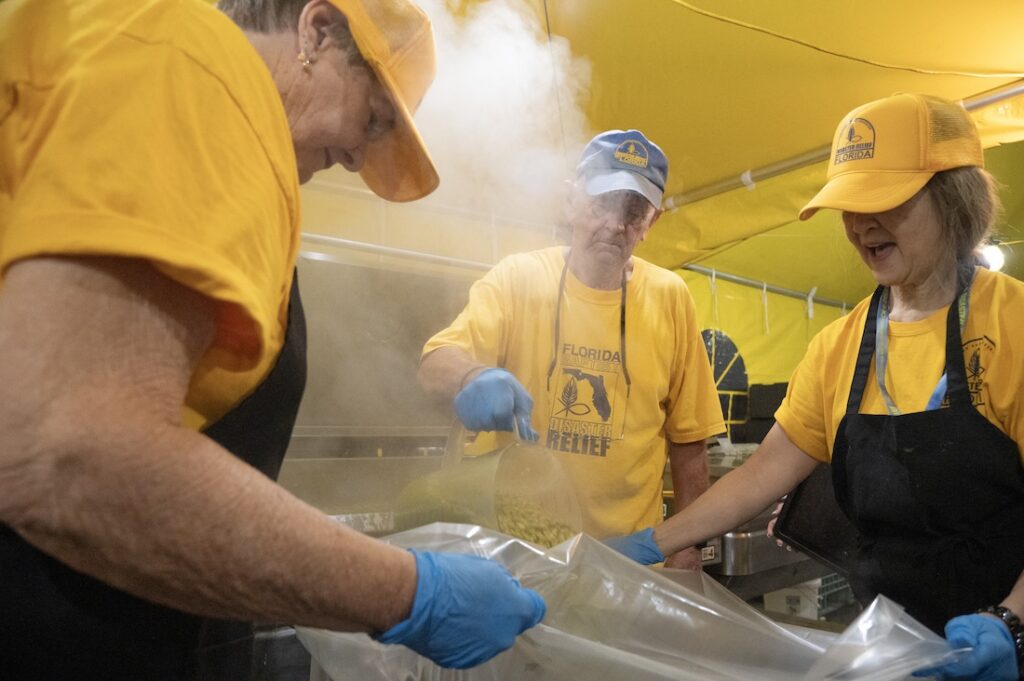Whenever I’m preaching and I need to make a point about the beauty of the church in action, I often refer to the image of God’s people with arms outstretched running toward places of deepest pain and suffering — being first on the scene after a disaster, bringing hope and healing through physical and tangible expressions of love in times of darkness. This is the church at her best, when we share and show the love of Jesus.
For decades now, Southern Baptists have been at the forefront of mercy and compassion ministries, whether distributing meals to people after a hurricane or tornado, or gutting houses after a flood, or being among the first to welcome and serve refugees from war-torn lands as they integrate into American life, or providing services to pregnant women in distress, or stepping in as foster parents or assisting in adoption. We stand in a long line of Christians who have served those in need, and our testimony in this area directly contradicts the falsehoods and accusations of those on the Left who claim that Christians are uncaring or unconcerned for the less fortunate. Julian, the last pagan emperor of Rome, was angered by the philanthropy of the early Christians, because their support for not only their own poor but also for non-Christians put to shame the Empire’s woefully inadequate work for those in need.
The world is a different place because of the witness of those early Christians, and the legacy of this admirable work continues, though now in many cases with government support instead of government opposition. When disasters come, when refugees arrive, when orphans need homes, government agencies now step forward with resources and then look for partners to distribute meals, rebuild homes, and meet other needs.

For more than two decades now, evangelicals have been asking the federal government to stop discriminating against faith-based charities when awarding contracts or partnering in relief ministry. Recently, the U.S. Supreme Court ruled in favor of Christian adoption agencies that had been unfairly discriminated against because of their religious convictions. Many evangelicals are encouraged to see President Trump’s recent establishment of a faith office that ensures faith-based charities are able “to compete on a level playing field for grants, contracts, programs, and other Federal funding opportunities.”
While Baptists maintain a strict line opposing the government’s interference with local churches, there’s a long-standing precedent of Baptist organizations partnering with agencies that work with federal or state governments (children’s homes, disaster relief, refugee resettlement, foster care, etc.), as long as there are no religious strings attached. Many Baptist churches did not see a conflict of separation of church and state when utilizing PPP funds distributed by the government to help small businesses continue to pay employees during the pandemic, and many Baptist colleges and universities receive Pell Grants or rely on government-funded student loans. A similar principle motivates advocacy for school choice — a movement now spreading into multiple states — which would make distinctively Christian education more affordable for the average Christian family through government-funded tax credits or reimbursements.
Still, some believe that any governmental connection in compassion ministry is in itself a sign of compromised convictions or that religious groups must now do the bidding of whatever administration is in power. But this view demonstrates a deep misunderstanding of how disaster relief, foster care, or refugee resettlement takes place.
For example, in the case of feeding hungry people or building and rebuilding homes, it is most often the case that the government provides resources through FEMA or other agencies, like the American Red Cross or the Salvation Army, while Southern Baptists provide the volunteers who step into situations to bring hope and healing. Yes, the meals or building materials may flow indirectly from the government, but Baptists utilize these resources in partnership with other agencies so the thousands of volunteers can do their good work and share Christ in the process. What’s more, the Cooperative Program and other offerings made it possible for associations and state conventions to purchase the equipment — mobile kitchens, showers, laundry trailers, mud-out tools — that built the infrastructure that has turned Southern Baptists into an indispensable part of any significant disaster relief response.
It is not a matter of Southern Baptist Disaster Relief becoming the arm of the government—it’s the government recognizing and supporting Christians who are eager to stretch out their arms to their neighbors in need. Baptist ministries don’t depend on public resources; public resources extend and amplify Baptist ministry.
In 2017, President Trump invited representatives from the three largest disaster relief organizations to the White House. Seeing the American Red Cross, the Salvation Army, and Southern Baptist Disaster Relief in the Oval Office testified to the power of Christian compassion. During the meeting, North American Mission Board president Kevin Ezell (representing Southern Baptists) mentioned the 50-year record of Baptists helping those in need and the joy of seeing hundreds of thousands of people fed a day because of the partnership and cooperation between the government and these groups. In many issues connected to compassion, it is not a matter of the church needing the state; it’s the state needing the church — looking to Christian organizations to supply the manpower and volunteers that make a difference. The church bests the government when it comes to boots on the ground helping those in need.
It’s true that any time government interests align with or intersect with the mission of the church, there’s the possibility that pressure could be brought to bear on an organization to change its convictions. We’ve seen organizations bow under this kind of pressure, which is why Baptists must reject any assistance that would require us to compromise our faith in Jesus Christ and our service in his name. Put simply, if the government’s resources dictate the terms of use in ways that compromise our conviction, they must always be rejected.
This is why over the past few decades, conservative Christians have lobbied for the government to not discriminate against faith-based charities that adhere to core doctrinal and ethical convictions. To claim now, as some are, that no governmental assistance should ever be offered to Christian organizations is an argument for enshrining secularism. It’s to make the case that the government should only partner with or assist non-religious organizations. That understanding would disfavor groups like Samaritan’s Purse, Send Relief, the Salvation Army, and many more.
I, for one, am grateful for Southern Baptists who both give and go — who make the love of Christ tangible for neighbors in need through care and service. And I am grateful to live in a country where there’s freedom to work with governmental organizations that recognize our indispensable service and that don’t require the gospel of Jesus to be muted or muzzled as we demonstrate his love.
Published February 14, 2025
